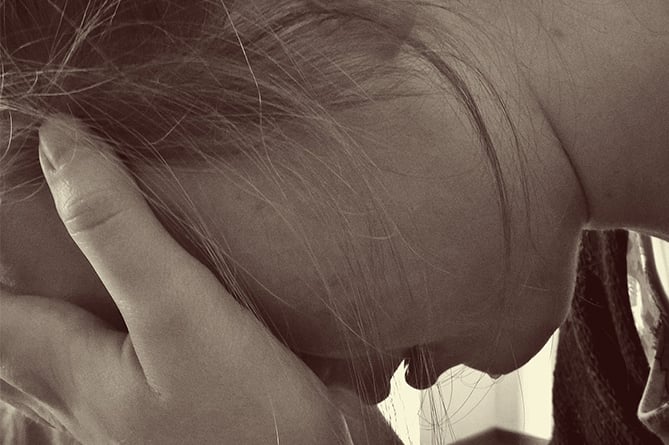Just three per cent of frontline homelessness support staff in Wales say appropriate help is available, a report has shown, with figures showing that officers from Dyfed-Powys and North Wales police responded to thousands of emergency callouts for people experiencing a severe mental health crisis and health boards received tens of thousands of urgent referrals.
The Mental Health on Hold report by The Wallich details barriers to access and a “breakdown in the mental health referral system”, leading to vulnerable people in crisis being “criminalised and retraumatised”.
Charity incident reports show thousands of incidents of self-harm, suicide, overdose and aggressive behaviour.
Figures in the report show that between 2017 and 2021, Dyfed-Powys Police officers responded to 2,178 emergency callouts for people experiencing a severe mental health crisis, with that figure as high as 606 in the pandemic-hit 2020.
In North Wales, officers responded to 4,238 such calls in the same five-year period.
In Hywel Dda, the report showed that between 2017 and 2021, the health board received 18,773 urgent referrals for people experiencing mental health crises.
113 of the urgent referrals in Hywel Dda were from people recorded as being homeless or having no fixed abode, figures show.
Powys Teaching Health Board received 2,495 urgent referrals between 2018 and 2021 – 2017 figures were not available – with 24 of those from people recorded as homeless.
Betsi Cadwaladr did not provide the relevant information.
Key findings of the report
A survey of frontline homelessness staff in Wales asked about accessing mental health support for people in crisis:
- 83% found it difficult to access the right support for clients.
- 63% said they found it really difficult.
- 8% said that no help was available.
- 3% of staff said appropriate support was available.
Following the concerning results of a staff survey in the summer of 2022, The Wallich undertook an investigation into the current landscape of crisis mental health provision for people experiencing homelessness in Wales.
After extensive research over the past eight months, the report – released on 28 March — found that the mental health emergency “disproportionally affects people experiencing homelessness.”
During the early pandemic, between March and October 2020, The Wallich’s specially trained support staff helped more than 4,000 people experiencing homelessness.
The Wallich’s staff say they are increasingly concerned and frustrated by their inability to get help and support for people in mental health crisis.
They were surveyed in August 2022 about their experiences, which showed that 96 per cent have supported clients in severe mental health crisis, and 66 per cent found it really difficult to access the right support for clients and were not satisfied with the support available.
Just three per cent of staff surveyed said their experience of accessing mental health support was straightforward and that appropriate support was available.
76 per cent feel there are no appropriate referral pathways in their area for clients with severe mental health needs.
Amy Lee Pierce, head of communications and public affairs at The Wallich said: “We strongly feel that access to the right mental health care at the right time is an essential prerequisite to permanently ending homelessness.
“People with experiences of homelessness, and more widely those with experiences of trauma, are disproportionately more likely to suffer from poor mental health than the general population.
“Without the right care and support, they are at greater risk of declining wellbeing to the point of crisis, at which point it is typically housing support workers like our frontline staff who respond, sometimes even saving lives.”
The Wallich records
Analysis of 4,216 records across three years, on the charity’s incident management system found:
- 481 incidents of self-harm or suicidal ideation.
- 294 incidents relating to drug or alcohol overdoses.
- 1,508 incidents of erratic or aggressive behaviour.
The Wallich analysed 4,216 records across three years, pre and post pandemic, on their incident management system and found: 481 incidents of self-harm or suicidal ideation; 294 incidents relating to drug or alcohol overdoses; and 1,508 incidents of erratic or aggressive behaviour.
The charity concludes through further analysis that most of these incidents are a result of or related to mental health crises.
The report says that “complex referral pathways and systems being stretched to their limits”, meaning “it is very difficult for people in crisis to get any help at all from dedicated mental health services, meaning emergency callouts are the only option for worried staff.”
In 1,845 incidents police were called out, and on 861 occasions an ambulance was called out.
This serves to” further retraumatise and in some cases, criminalises vulnerable people,” the report added.
Thomas Hollick, report author and policy and public affairs coordinator at The Wallich, said: “In a properly functioning system, we do not believe it should be the role of police or ambulance services to respond to an individual experiencing a severe crisis.
“However, that is the reality at present, as the only option to prevent serious harm and save lives in an emergency.”
In order to get an accurate picture of the current state of mental health service provision across Wales, The Wallich then sent a series of Freedom of Information (FOI) requests to each of the seven health boards, as well as to the 22 local authorities, the four police forces, the ambulance service, and to Welsh Government.
The report says that the responses “show that services are highly fragmented, with a real diversity of provision and referral routes across different areas.”
In the report, The Wallich details what referral pathways exist, what eligibility criteria is in place, what provision there is for co-occurring mental health and substance use needs, and what work is being done to build partnerships to share good practice and skills.
“Often the details provided by the FOI’s do not match the reality of the experiences of frontline homelessness staff,” the report adds.

Jack Sargeant, Member of the Senedd for Alyn and Deeside, said: “I am really grateful to the Wallich for putting this report together.
“The Wallich are on the frontline of what is a really difficult and worsening housing situation.
“I have written before about the need for trauma informed public services or as I called them “kinder” services.
“If we don’t recognise the trauma people have been through and tailor services to it, we are letting them down twice – once by not protecting them from trauma, and again by not recognising it.
“Thank you again to The Wallich for doing so much to promote a trauma informed agenda.
“I would encourage everyone to engage with this work.”
The report makes a number of recommendations to health boards, local authorities and other bodies, including the charity themselves.
Their recommendations focus on ways to re-incentivise partnership working, to develop holistic, person-centred services.
They cite the Trauma Informed Wales Framework as a great example of how this could work in practice, by putting questions of accessibility right at the heart of service design.
Lindsay Cordery-Bruce, CEO of The Wallich, said: “The feeling of constantly being turned away from services, of being left ‘on hold’, is something that repeatedly came up as retraumatising our clients. A ‘no wrong door approach’, where people are helped wherever they present, would be genuinely transformational.
“We must all be committed to ensuring that everybody experiencing homelessness and severe mental ill health is able to access the right support at the right time.”





Comments
This article has no comments yet. Be the first to leave a comment.